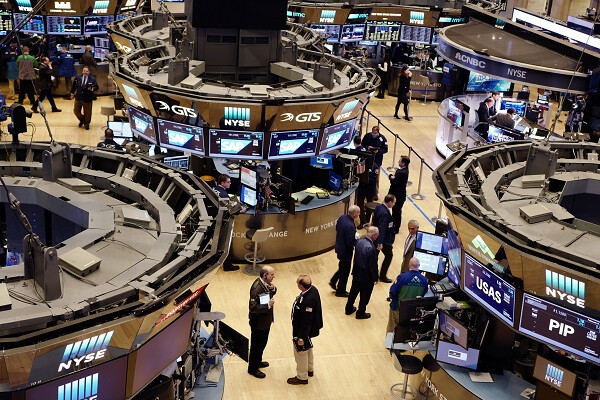
NEW YORK, NY – The three major U.S. stock indexes surged on Thursday as news broke that the United States and China had reached an agreement to suspend the implementation of new tariffs following recent trade negotiations. This development injected a wave of optimism into the market, overshadowing concerns stemming from a further decline in U.S. consumer sentiment and persistent upward pressure on short-term inflation expectations.
The Dow Jones Industrial Average (DJIA) closed at 42,654.74, marking a significant gain of 331.99 points, or 0.78%, from the previous trading day. Similarly, the S&P 500 Index, a benchmark for large-cap U.S. stocks, advanced by 41.45 points, or 0.70%, to finish at 5,958.38. The technology-heavy Nasdaq Composite Index also experienced a robust increase, climbing 98.78 points, or 0.52%, to settle at 19,211.10.
Market analysts attributed the day's strong performance primarily to the positive sentiment generated by the U.S.-China trade discussions. The agreement to temporarily halt the imposition of additional tariffs alleviated investor anxieties surrounding a potential escalation of trade tensions between the world's two largest economies, which have been a persistent source of market volatility in recent periods.
The positive news on the trade front appeared to outweigh the impact of concerning domestic economic data. The University of Michigan's preliminary reading of the May consumer sentiment index revealed a further dip to 50.8, down 1.4 points from the final April reading of 52.2. This figure reflects a weakening confidence among American consumers regarding the current and future state of the economy.
Adding to the economic unease, the survey also indicated a significant rise in short-term inflation expectations. The one-year inflation outlook climbed to 7.3%, a substantial 0.8 percentage point increase from the previous month's 6.5%. This marks the highest level of short-term inflation expectations recorded since 1981, raising concerns about the persistent nature of inflationary pressures within the U.S. economy.
Despite these concerning economic indicators, the prevailing market narrative was dominated by the optimism surrounding the U.S.-China trade development. Callie Cox, chief market strategist at U.S. asset management firm LPL Financial, commented, "This week, a sense of relief regarding U.S.-China tariffs has been the dominant factor in the market. The buying momentum driven by investor sentiment has clearly overshadowed the weaker economic data."
The positive risk-on sentiment spurred by the potential for improved U.S.-China relations also extended to the oil market. International crude oil prices experienced notable gains as the prospect of continued economic activity and demand was bolstered by the trade news.
On the New York Mercantile Exchange (NYMEX), West Texas Intermediate (WTI) crude oil futures for July delivery closed at $61.97 per barrel, an increase of $0.82, or 1.34%. In London, Brent crude oil futures for July settlement also saw a significant rise, closing at $65.41 per barrel, up $0.88, or 1.36%.
The concurrent rise in both equity and oil markets underscores the significant influence of geopolitical and trade-related developments on global financial markets. While underlying economic data provides crucial insights into the health of the economy, investor sentiment and the perceived trajectory of international relations can often exert a more immediate and powerful impact on asset prices. Market participants will continue to closely monitor future economic releases and developments in U.S.-China trade relations for further direction.
[Copyright (c) Global Economic Times. All Rights Reserved.]



























